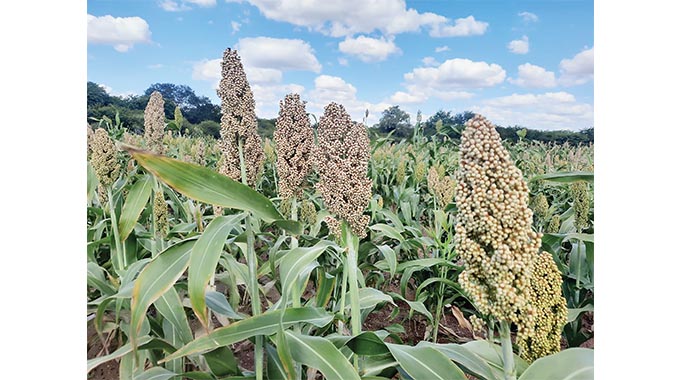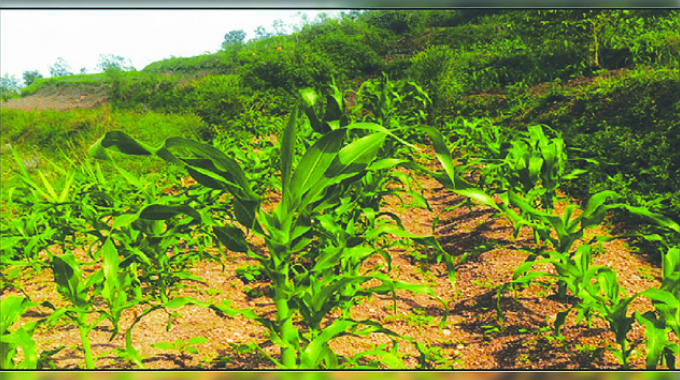Foreign white beauty Queen starving Zimbabweans

Stephen Mpofu, Perspective
Global warming fronted by changes in the climate which boast vicious recurrent droughts and cyclonic floods have rendered many homes in this country and elsewhere around the global village food-insecure and remains a big poser for our African continent to counter the damning after-effects.
At the centre of the horrendous effects of climate change is of course the white food grain, maize, which made its advent on the African continent with a storm in 1500 AD from its origin in the Mexican highlands courtesy of sailors seeking a sea route to India. The magnetic power of money instantly caused maize’s dominance over the cultivation of rapoko, millet and sorghum in Zimbabwe, as well as yam in other African States as more people resorted to maize cultivation for the attractive price offered on the market place.

sorghum
As the years passed, preference to cultivating maize over small grains grew and grew to the extent that the traditional grains have been shoved in the shade as many farmers in drought prone regions prefer cultivating maize for the price that the queen white grain commands on the market place. As a result, in lean rainfall years, such as this and previous years in our country hearths go cold with no maize meal to cook on the fire as meals from small grains remain Cinderella-ed as it were.
In the circumstances, with many people from drought-prone regions making bee-lines to neighbouring states for work to earn money for food back home and with the Government sometimes compelled to spend a lot of foreign currency on food imports, a loud, clear call for a return to traditional grains appears overdue for people in drought-prone districts.
Yes, dams are being constructed around Zimbabwe but with recurrent droughts in some parts of the country, the water bodies in question cannot, and should not be expected, to supply adequate water for irrigating food crops as well as providing water for domestic use with droughts remaining recurrent the way they are.

construction of Tuli Manyange Dam in Gwanda District
Which therefore calls for a loud and clear return to small grains that sustained millions of our people before the advent of maize. Yes, some Government authorities have recently been heard urging villagers in rain-lean districts to cultivate small grains for their sustenance while maize should be concentrated in districts with regular rainfall.
However, much more is required to make those verbal exhortations practically effective.
To this end, a Zimpapers librarian at Chronicle in Bulawayo, Mrs Hilda Marijeni, could not have better sounded concerns of this communicologist and those of other concerned Zimbabweans when she said two days ago that a massive “awareness campaign’’ was needed for people to not bury their heads in the sand, as it were by persistently growing maize instead of small grains in regions where droughts now appears to be the norm.
This obviously suggests that farmers’ unions, rural legislators and traditional leaders also go the whole hog in awareness campaigns for a return to small grains in rainfall-shy regions so that no one dies of hunger in our country.
(This writer was born and raised in rural Zimbabwe during the colonial era and can confirm what elders often said when referring to small grains as “providing food that stays in the stomach all day long”, for better nutrition especially for children growing up. Unfortunately, however, small grains such as rapoko and sorghum are preferred for brewing beer in many rural homes.)

Brewing traditional beer
Some Government officials have lately also spoken about the need for Zimbabweans to take mitigatory measures against global warming.
Zimbabwe or other African countries are not known to have been actively involved in formulating the Paris Agreement on global warming in which big powers such as the USA and its global, economic and ideological rivals on the other side of the Atlantic Ocean were involved.
However, Zimbabweans, like other nations elsewhere in the global village need to prevent the existence of any unmodified factory chimneys, coal plants and veld fires all of which spew toxic gases into the atmosphere with the result that the ozone layer that protects the Earth from the dangerous rays of the sun is rendered wafer thin with the result that the Earth is heated up, causing global warming which accompanied by droughts and cyclone-driven floods such as have been experienced in Zimbabwe and elsewhere and are likely to continue in the future if no urgent global remedial actions are taken by potential country victims.
Desertification is another phenomenon that must be brought to an end once and for all in our country which currently experiences the denudation of 33 000 hectares of woodlands each year with the Midlands province reportedly accounting for 10 000 hectares of the forestry destruction.
Trees play a critical role in the fight against global warming by absorbing and sinking the toxic gases that damage the ozone and Zimbabweans should be made aware of this with the stick waved against offenders to enforce compliance and in the process save humanity from waking up one day in a desert with no water for people and animals to drink or with which to cook food for our sustenance.
The above discourse MUST be regarded by all as a WAKE-UP call for action while there is still time for survival.










Comments